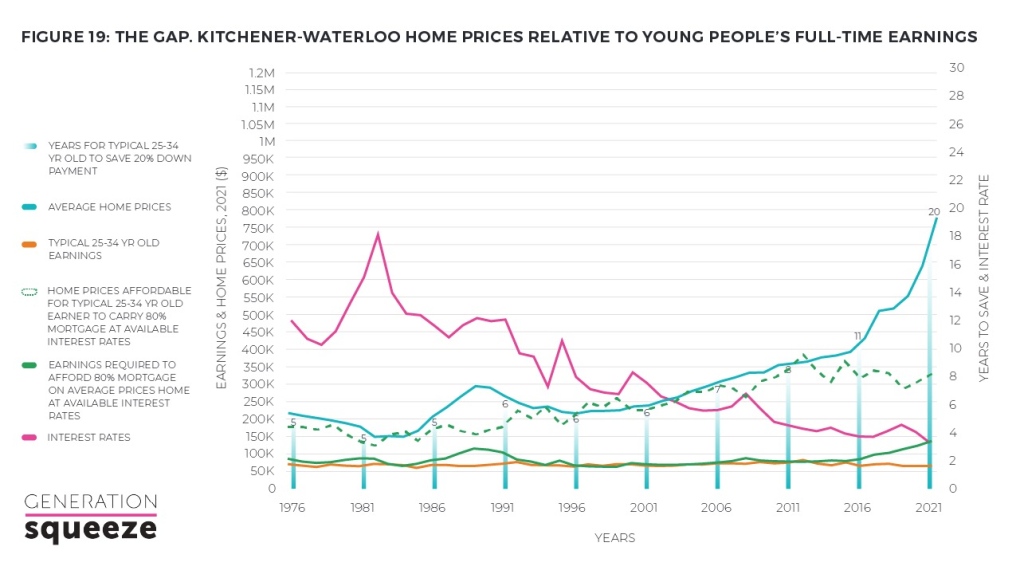Young people in K-W need to save for an average of 20 years to afford a down payment: report
Amanda Luloff lives in a two-bedroom apartment in Cambridge, but has been looking for a house to call home for years.
“Today’s housing market is very hard,” the single parent says. “I’m 43-years-old, I’m a single mom. I feel like I’ll never be able to own a home.”
While it’s not difficult to find people in Luloff’s situation in Waterloo region and across the country, a new report shows just how drastically housing prices have outpaced many people’s budgets.
Comparing average earnings to average home prices, the charitable think tank Generation Squeeze determined it would take a typical young person in Kitchener-Waterloo 20 years of full-time work to save a 20 percent down payment on an average-priced home.
In 1976, a typical 25 to 34 year old earner could save a 20 per cent down payment in five years.
“Ontario’s lost control of home prices more over a two year period than any other province at any other time in the last half century,” says Paul Kershaw, the founder and lead researcher of Generation Squeeze.
The group’s "Straddling The Gap" report shows house prices need to drop by more than $500,000 for a typical young person to afford an average home in Ontario. In Kitchener-Waterloo, prices need to drop by more than $445,000.
 A graph of Kitchener-Waterloo home prices relative to 25 to 34 year olds earnings. (Generation Squeeze)
A graph of Kitchener-Waterloo home prices relative to 25 to 34 year olds earnings. (Generation Squeeze)
“Too often we tend to sort of individualize the harm that’s happening to younger Canadians in our housing market as opposed to talking about how our housing system is quite dysfunctional,” Kershaw says.
After analyzing data from the Canadian Real Estate Association and comparing it to Statistics Canada data on annual income, the report concludes that home prices should stall for years ahead or continue to fall moderately.
HOUSING MARKET COOLING
Alexis Soha with the Noble Realty Group in Kitchener says she has already seen a downward pressure in the cost of homes.
“I have seen a decrease in home prices, for sure,” Soha says. “Part of that is the rising interest rates that are factoring in. It’s costing more to own a house, especially now with inflation and the day-to-day cost of living. All of this is coming into play when it comes to impacting prices in the market.”
While Luloff saves every month for a home, she says it’s easier said than done and worries for her young daughter’s future when she too will need a home.
“What is it going to look like in 16 years when she wants to buy, when she wants to move? If the economy is so up right now, what is it going to look like for my four-year-old,” she says.
In its latest monthly release, the Waterloo Region Association of Realtors reports the housing market saw a continued cool down in November with the number of home sold year-over-year down by nearly 44 per cent and the average sale price dropping more than 10 per cent.
The stall is something Generation Squeeze argues needs to continue for many years ahead to make housing more attainable for would-be buyers.
CTVNews.ca Top Stories

Doctors say capital gains tax changes will jeopardize their retirement. Is that true?
The Canadian Medical Association asserts the Liberals' proposed changes to capital gains taxation will put doctors' retirement savings in jeopardy, but some financial experts insist incorporated professionals are not as doomed as they say they are.
Something in the water? Canadian family latest to spot elusive 'Loch Ness Monster'
For centuries, people have wondered what, if anything, might be lurking beneath the surface of Loch Ness in Scotland. When Canadian couple Parry Malm and Shannon Wiseman visited the Scottish highlands earlier this month with their two children, they didn’t expect to become part of the mystery.
Fair in Ontario, flurries in Labrador: Weather systems make for an erratic spring
It's no secret that spring can be a tumultuous time for Canadian weather, and as an unseasonably mild El Nino winter gives way to summer, there's bound to be a few swings in temperature that seem out of the ordinary. From Ontario to the Atlantic, though, this week is about to feel a little erratic.
What a urologist wants you to know about male infertility
When opposite sex couples are trying and failing to get pregnant, the attention often focuses on the woman. That’s not always the case.
He replaced Mickey Mantle. Now baseball's oldest living major leaguer is turning 100
The oldest living former major leaguer, Art Schallock turns 100 on Thursday and is being celebrated in the Bay Area and beyond as the milestone approaches.
'It was instant karma': Viral video captures failed theft attempt in Nanaimo, B.C.
Mounties in Nanaimo, B.C., say two late-night revellers are lucky their allegedly drunken antics weren't reported to police after security cameras captured the men trying to steal a heavy sign from a downtown business.
Bank of Canada officials split on when to start cutting interest rates
Members of the Bank of Canada's governing council were split on how long the central bank should wait before it starts cutting interest rates when they met earlier this month.
Quebec nurse had to clean up after husband's death in Montreal hospital
On a night she should have been mourning, a nurse from Quebec's Laurentians region says she was forced to clean up her husband after he died at a hospital in Montreal.
Northern Ont. lawyer who abandoned clients in child protection cases disbarred
A North Bay, Ont., lawyer who abandoned 15 clients – many of them child protection cases – has lost his licence to practise law.





























